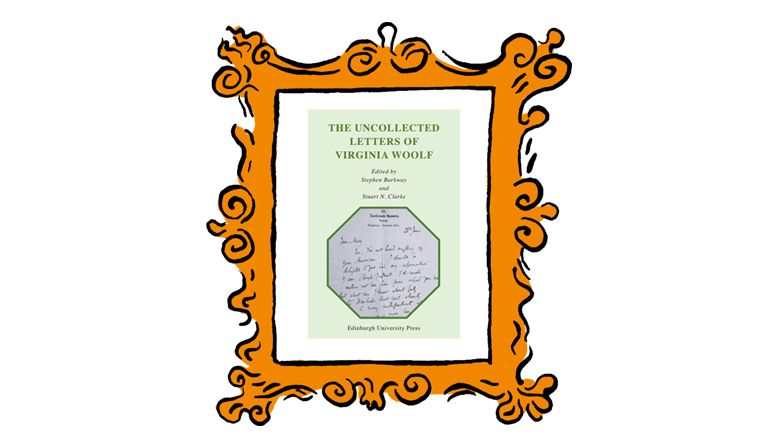This is a review of a book I haven’t read. Hardly an unusual circumstance for book reviews these days—but, in this case, I was not able to acquire a copy.
Earlier this year, Edinburgh University Press brought out The Uncollected Letters of Virginia Woolf, and by “uncollected” is meant 1,400 letters that, for various reasons, were not included in the six-volume edition of Woolf’s correspondence. This, by any standards, is an exciting publication. The editors of the new volume, Stephen Barkway and Stuart N Clarke, have included, for instance, some 50 letters from Woolf to TS Eliot, never before published.
This, you might think, would still excite what remnants of the literary world there are left, and bears repeating: Edinburgh University Press has published 50 new letters from Virginia Woolf to TS Eliot, the lion and unicorn of modernist writing in English. I have so far seen a single write-up, in the Literary Review.
Commissioned by Prospect, I approached EUP for a review copy, and was soon told that they now operate a digital-only policy and that I would have to work from a PDF. Print editions were only being sent to reviewers with access needs, which somehow seemed the wrong way round. I replied truthfully, and with apologies, that I owned no device on which I could comfortably read and annotate 1,056 pages—and so would be unable to write the review. This is, doubtless, precious and old-fashioned of me, but there it is. I like books to smell of paper and had looked forward to supplementing the Woolf letters I already own, edited so brilliantly by Nigel Nicolson and Joanne Trautmann, issued so handsomely by The Hogarth Press between 1975 and 1980, their pastel-spines fading, their jacket illustrations by Woolf’s niece, Angelica Garnett.
Then I thought I would swallow my pride and buy the Uncollected Letters, and found that, for eBook as for hardback, Edinburgh University Press will not accept a penny less than £195. Sic. Each page costs 18.46p, therefore. If you’re happy to buy books on Amazon, they’ve knocked it down to £160.57, which is nice of them. EUP could presumably respond with sound financial reasons as to the price, but it seems to me an almost wilful refusal to try and shift copies. Every university library in the land will purchase one, a few Woolf super-fans may rise to the expense and the rest of us will make a mental note to glance at it in the London Library (or wherever) and probably never will.
The original Hogarth volumes of Woolf’s letters were priced, in 1975, at £7.75, rising to £15 five years later. This was not cheap, the equivalent to £85-ish today. But £195 is on another level. To put it in perspective, let me use that £195 of Uncollected Letters as a unit of value, and remind readers that, for example, the writer who covered them in the Literary Review will have been paid just over 0.25 Uncollected Letters; that my monthly direct debit with Octopus Energy is equivalent to 1.10 Uncollected Letters; that I will be paid 1.28 Uncollected Letters for this piece of writing; and that, when the London Review of Books covers this new edition, as I trust and hope it will, the chosen critic will receive a sum in the region of 13 Uncollected Letters. Such is the current fiduciary ecosystem of the writing world, which few deny is broken and few attempt to solve. I may yet purchase the book with the fee for this, which leaves £55 for Octopus.
But it is hard to think that the world once fondly referred to as one “of letters” (collected or otherwise) does not half-deserve its dwindling readerships and shattered finances when a volume of new writing, from a writer who continues to command a vast, maybe exorbitant, level of attention, is listed at such an absurdly inflated price. These letters are not documents to interest only a small band of scholars. £195 might seem reasonable for Lady Chatterley’s Liver: The Medical Records of DH Lawrence, Vol 9.
It can’t be entirely utopian to think there could have been another way. (In October, Princeton University Press will publish three newly uncovered Woolf stories, admittedly a shorter book, for £16.99.) Readers flock to Woolf; her name is still a shortcut to sales. Think of the gift shop at Charleston, the annual literary festival in her sister’s country home and the beautifully bound volumes that could have appeared on its front tables. Were there no means of obtaining funding; no way of asking a rich author’s foundation—or just a rich author—to supplement the printing; no publisher that could produce a reasonably priced volume, with bound proof copies to aid a publicity campaign?
People don’t read letters anymore, perhaps, which, if true, is a sadness in a world that no longer writes them. But witness the popularity of the Letters of Note books and events, or the chunky volumes of correspondence from Seamus Heaney or Oliver Sacks that appeared over the last year; not cheap at £40, but within the bounds of possibility. Critical coverage was wide (I cannot speak for sales). The collected letters of Samuel Beckett are available complete (four handsome hardbacks) for £105 from Cambridge University Press; Faber, and the tireless editor John Haffenden, plough on through the TS Eliot correspondence, the tenth volume published in July (£60 for 1,136 pages), with ten or more still to come.
On such projects go. The new Woolf letters, the first to appear in 45 years, would I think attract a number of readers with the stamina to read cover to cover, and an even greater number who would put it by the bed or the downstairs loo to dip happily in and out. But perhaps the ideal would now be to fund a fully searchable, fully annotated, online database of an author’s collected letters, with edited highlights then appearing between hard covers at affordable price and readable length? My solution would be to batter at the doors of the Arts Council until it commits to a publishing arm, which of course it never will: a public service publisher, equivalent to Radio 3 and the BBC orchestras, where projects of literary importance but small commercial chances can still find audiences, without bricking themselves up behind the extortionate prices of an academic press.
Figures on the level of Woolf and Eliot inspire, these days, a great deal of repackaging and precious few books full of new information. Here is one, but we can hardly complain of the scant notice paid by what Woolf called the common reader if we stand by and watch that reader priced out of serious engagement with new scholarship. The door to the ivory tower is barred, moated round with the impenetrable muddy water that divides commercial scholarship from academic.
I have clung to my stubborn refusal of the eBook. Woolf is to be read, not scrolled; her letters should not be the privilege of academics and the interested rich.
AI could read an eBook of course, so I asked it: “Are The Uncollected Letters of Virginia Woolf any good?” “Yes”, it replied, “The Uncollected Letters of Virginia Woolf is widely regarded as a valuable addition to the Woolfian canon.” There now. Readers aren’t needed at all. It’s a bleak vision of the future, from Ballard or Borges: of books too expensive for humans that only academics and robots can read.












